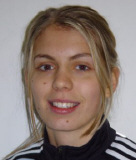Results for Wednesday, February 15
 Freestyle Skiing: In men's moguls, Russian skier Vitaly Glushchenko, 28, finished 35th in the qualifying round, with a total score of 12.75, and did not advance to the final; the gold medallist's score in the final was 26.77.
Freestyle Skiing: In men's moguls, Russian skier Vitaly Glushchenko, 28, finished 35th in the qualifying round, with a total score of 12.75, and did not advance to the final; the gold medallist's score in the final was 26.77.Luge: A pair of 18-year-olds from Romania, Cosmin Chetroiu and Ionuţ Ţăran, finished 18th in the luge doubles; their time after two runs was 1:39.593, about five seconds behind the gold medallists. Three teams did not finish.
Nordic Combined: The remainder of the team event has been postponed until tomorrow. Bad weather.
 Short Track Speed Skating: The women's 500-metre final was run today, but the heats were run on Sunday. The slowest heat time was put in by Hungarian skater Rózsa Darázs, whose time of 1:10.558 was considerably behind the rest -- the gold medallist's time in the final, for example, was 0:44.345. The 18-year-old Darázs was Hungary's flag-bearer during the Opening Ceremonies; I haven't been able to find any news that indicated a fall or crash, but it's almost certainly something along those lines.
Short Track Speed Skating: The women's 500-metre final was run today, but the heats were run on Sunday. The slowest heat time was put in by Hungarian skater Rózsa Darázs, whose time of 1:10.558 was considerably behind the rest -- the gold medallist's time in the final, for example, was 0:44.345. The 18-year-old Darázs was Hungary's flag-bearer during the Opening Ceremonies; I haven't been able to find any news that indicated a fall or crash, but it's almost certainly something along those lines.Standings to date: Additional last-place finishes move Romania and Russia up the standings, Romania into first place -- overtaking South Korea! -- and Russia into fifth. Algeria, with only two athletes at these Games (more on small delegations from Runner-Up) slides into sixth.
Labels: algeria, alpine skiing, freestyle skiing, hungary, luge, romania, russia, short track, torino 2006

